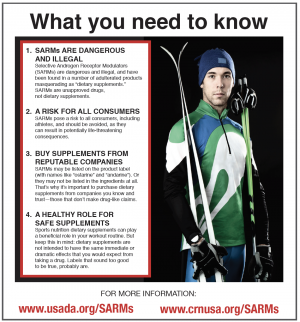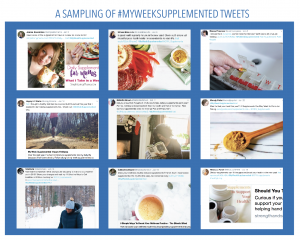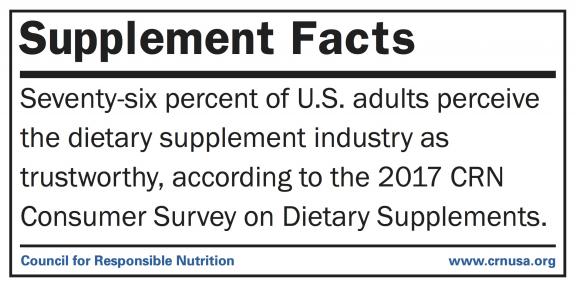A topline report from the Council for Responsible Nutrition (CRN),
the leading trade association for the dietary supplement and functional food industry
Spread the word this Olympic season: #SARMsCanHarm
 SARMs are dangerous, illegal, and have no place in dietary supplements or any sports nutrition regimen,” upholds CRN as part of a new consumer education initiative: #SARMsCanHarm. Commonly labeled as “ostarine” or “andarine,” FDA warns that Selective Androgen Receptor Modulators (SARMs) are unapproved drugs illegally marketed as dietary supplements and pose a serious threat to consumer safety, particularly in the bodybuilding and fitness communities. To amplify this message, CRN created a #SARMsCanHarm toolkit for fitness organizations that includes customizable flyers, newsletter material, and social media content featuring educational information on SARMs and tips for how athletes can protect themselves from products containing these illicit ingredients.
SARMs are dangerous, illegal, and have no place in dietary supplements or any sports nutrition regimen,” upholds CRN as part of a new consumer education initiative: #SARMsCanHarm. Commonly labeled as “ostarine” or “andarine,” FDA warns that Selective Androgen Receptor Modulators (SARMs) are unapproved drugs illegally marketed as dietary supplements and pose a serious threat to consumer safety, particularly in the bodybuilding and fitness communities. To amplify this message, CRN created a #SARMsCanHarm toolkit for fitness organizations that includes customizable flyers, newsletter material, and social media content featuring educational information on SARMs and tips for how athletes can protect themselves from products containing these illicit ingredients.
CRN has the support of leading associations representing fitness organizations and sports clubs, who are circulating the toolkit among their members and encouraging them to disseminate the educational information to their consumer clientele. CRN advises retailers to take a stand and join responsible industry in spreading this crucial message to help keep SARMs off the market and out of the hands of consumers.
CRN reminds consumers, retailers: Supplements may not (legally) claim to treat opioid addiction
“Dietary supplements provide many positive benefits promoting better health and wellness, but they don’t treat opioid addiction,” advised CRN in response to a New York Times article that called attention to supplement companies marketing products claiming to treat opioid addiction. Additionally, CRN partnered with other dietary supplement industry trade associations to demonstrate a united front in protecting consumers. The bottom line: these product claims are not supported by mainstream published research, are misleading and detrimental to consumers, and, above all, are outright illegal. Retailers of dietary supplements, including online retail portals, should refuse to stock or sell any dietary supplements that claim to treat or cure opioid use disorder or addiction, or claim to reduce the symptoms of opioid withdrawal.
#MyWeekSupplemented campaign highlights power of supplements in daily life
 To spread positive messaging about dietary supplements, CRN partnered with Clever, an influencer marketing agency, on a new blogger campaign called #MyWeekSupplemented. The premise of the campaign is simple: bloggers chronicle a typical week of their lives and highlight the ways they incorporate dietary supplements into their daily routines. Using the hashtag #MyWeekSupplemented, the 15 participating bloggers posted photos to illustrate their supplement usage and included messaging, curated by CRN, to demonstrate the importance of healthy living and emphasize the value and benefit of including dietary supplements as part of an overall healthy lifestyle. The campaign concluded late last month and resulted in an impressive 18.4 million impressions and 12,200 social media engagements.
To spread positive messaging about dietary supplements, CRN partnered with Clever, an influencer marketing agency, on a new blogger campaign called #MyWeekSupplemented. The premise of the campaign is simple: bloggers chronicle a typical week of their lives and highlight the ways they incorporate dietary supplements into their daily routines. Using the hashtag #MyWeekSupplemented, the 15 participating bloggers posted photos to illustrate their supplement usage and included messaging, curated by CRN, to demonstrate the importance of healthy living and emphasize the value and benefit of including dietary supplements as part of an overall healthy lifestyle. The campaign concluded late last month and resulted in an impressive 18.4 million impressions and 12,200 social media engagements.
CRN Foundation puts its money where its mouth is, renews commitment to truth in advertising
The supplement industry self-polices to protect consumers against false and misleading advertising. As further evidence, the CRN Board of Directors has unanimously voted to commit an additional $735,000 over a three-year period to the Council of Better Business Bureaus to continue its support for the National Advertising Division (NAD) dietary supplement advertising review program. The NAD program monitors, reviews, and challenges advertising across mediums to level the playing field for competitors and to ensure consumers and retailers can trust supplement marketing.
 The NAD program, which celebrated its tenth anniversary last year, has been cited by the Federal Trade Commission (FTC) as a demonstration of “just how impactful self-regulation can be” and “a valuable complement to [the agency’s] own enforcement efforts to eliminate fraud in [the dietary supplement] industry.”
The NAD program, which celebrated its tenth anniversary last year, has been cited by the Federal Trade Commission (FTC) as a demonstration of “just how impactful self-regulation can be” and “a valuable complement to [the agency’s] own enforcement efforts to eliminate fraud in [the dietary supplement] industry.”
With this latest pledge, the CRN Foundation (CRNF) will have provided grants to NAD totaling more than $2.8 million since the dietary supplement self-regulatory initiative launched in 2006.
 Short and Tweet
Short and Tweet
Know your #SupplementFacts



